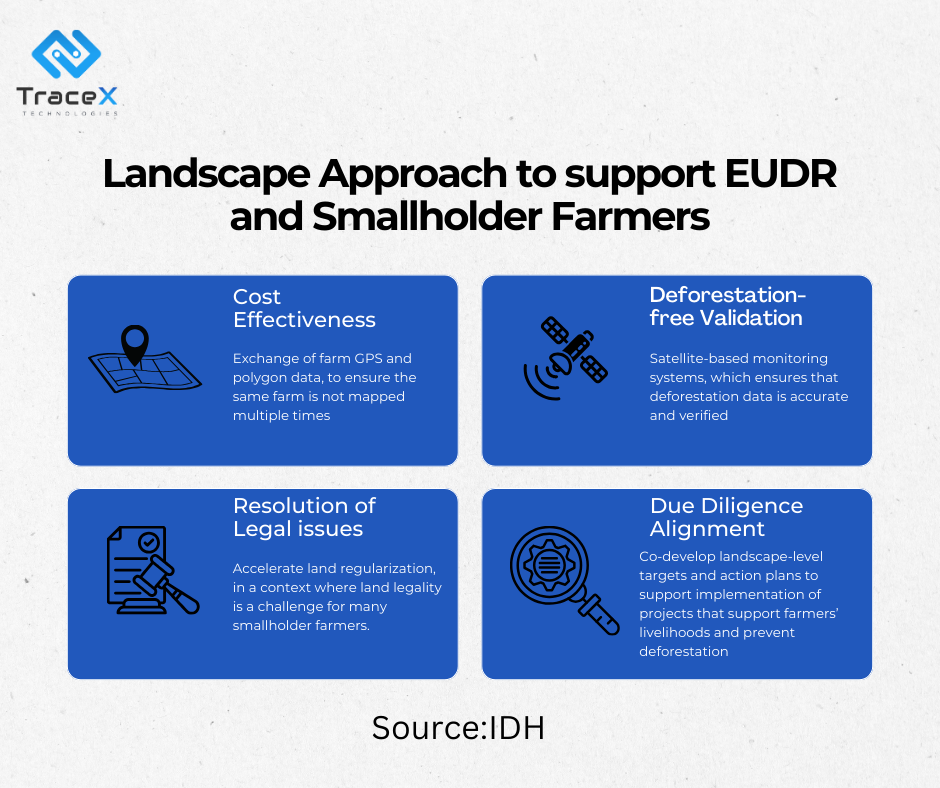Contact: +91 99725 24322 |
Menu
Menu
Quick summary: Explore the complexities and opportunities in navigating EUDR compliance for smallholder farmers. Our blog delves into the challenges they face and the potential benefits, offering insights into sustainable practices, regulatory alignment, and the transformative journey towards compliance excellence. Join us in understanding the pivotal role of smallholders in EUDR adherence and the broader landscape of sustainable agriculture.

In the ever-evolving landscape of sustainable and responsible sourcing, the European Union Deforestation Regulation (EUDR) stands as a pivotal framework aimed at curbing deforestation associated with the production of key commodities. Amidst this regulatory backdrop, smallholder farmers find themselves at the crossroads, facing both challenges and opportunities in navigating EUDR compliance.
About 500 million farms worldwide (84% of the total) are smaller than two hectares (ha). But they are far from homogeneous and only around 40% sell a substantial amount of their crops.
This blog dives into the intricacies of EUDR, shedding light on the hurdles faced by small-scale farming operations and exploring the avenues that hold promise for their sustainable practices. Join us on this journey as we unravel the complexities, share success stories, and discuss the tools and strategies that empower smallholder farmers to meet the requirements of EUDR while fostering a resilient and inclusive agricultural future.
The European Union Deforestation Regulation (EUDR) represents a groundbreaking initiative aimed at addressing the environmental impact of deforestation associated with the production of key commodities. In a world increasingly focused on sustainable and ethical sourcing, the EUDR emerges as a pivotal framework designed to curb deforestation and promote responsible practices across the supply chain.
The EUDR holds significant importance in the realm of sustainable and ethical sourcing for several compelling reasons. Firstly, it addresses the environmental challenges posed by deforestation, acknowledging its role in climate change, biodiversity loss, and ecosystem degradation. By enforcing compliance, the regulation seeks to mitigate these adverse impacts, fostering a more environmentally responsible approach to production.
Moreover, EUDR compliance aligns with the growing consumer demand for transparency and ethical practices. In an era where consumers are increasingly conscious of the environmental and social implications of their purchases, adherence to EUDR standards becomes a valuable assurance for brands and businesses. It signifies a commitment to responsible sourcing and contributes to building consumer trust and loyalty.
Furthermore, the regulation encourages the adoption of sustainable agricultural practices, supporting the United Nations’ Sustainable Development Goals (SDGs).
From promoting responsible land use to protecting ecosystems, EUDR compliance becomes an integral part of a broader effort to create a more sustainable and equitable global supply chain.
The EUDR primarily targets commodities linked to deforestation, such as soy, beef, palm oil, and timber. It places an obligation on companies to ensure that the products they place on the EU market are not associated with deforestation. The regulation covers aspects like due diligence, risk assessment, and supply chain transparency.
Smallholders form the backbone of the economy in many producer countries.
Smallholders’ important role in achieving sustainable development and food security is increasingly recognised in international policies such as SDG Targets.
In nations with tropical forests, smallholders, frequently comprising Indigenous Peoples and local communities (IPLCs), play a vital role in combatting climate change and preserving forests. However, they can also be contributors to forest destruction and degradation.
Deforestation and the conversion of forests by smallholders are often driven by subsistence agriculture or local markets. Additionally, these activities are linked to the production of (export) crops like cocoa, coffee, oil palm, and rubber, with some of these destined for the EU market.

Smallholders produce 95% of Vietnam’s coffee, 42% of Indonesia’s palm oil, and 95% of Thailand’s rubber.
The EU’s deforestation-free regulation (EUDR) aims to bar seven forest-related commodities and their products from the EU market if linked to deforestation. Producers and companies dealing in timber, palm oil, soy, rubber, cattle, cocoa, and coffee must provide evidence that their goods were not grown on deforested land since 2020. Compliance is required by December 2024, posing challenges for smallholders, who may lack the technical and financial capacity to meet the stringent due diligence requirements of the regulations. Finding ways to avoid small-scale producers being shut out of EU supply chains should therefore be a top priority for both exporting countries and the EU.

The intricate traceability demands may push smallholders away from participating in sustainable commodity markets.
To ensure EU policies on deforestation-free supply chains effectively recognise the rights and roles of smallholders, and addresses the underlying drivers of deforestation, the following principles must be integrated into its design and implementation:
Digital tools will play a crucial role in aiding companies and producers in monitoring deforestation and adhering to the new regulations. Mobile apps can assist traders in the vital initial phase of gathering geolocation data necessary for EUDR compliance, facilitating access to EU markets for more than millions of smallholder farmers globally. These apps promote inclusivity and transparency, with the potential for scalability to encompass other crops and regions engaged in trade with the EU.
TraceX Traceability Solutions play a pivotal role in assisting smallholder farmers with data collection and validation for EUDR compliance.
TraceX provides a user-friendly mobile application that enables smallholder farmers to collect essential data directly from their farms. This includes geolocation information, details of farming practices, and other relevant data points required for EUDR compliance.
TraceX integrates geospatial data, including satellite imagery, to provide a comprehensive view of land use, forest coverage, and potential deforestation risks. This integration enhances the accuracy of the data collected by smallholder farmers.
The system enables real-time validation of the data collected. This ensures that the information aligns with the compliance requirements, reducing the likelihood of errors or discrepancies.
TraceX incorporates automated compliance checks against EUDR regulations. This feature helps smallholder farmers identify any potential issues with their data or farming practices that may hinder compliance.
The platform ensures secure storage of collected data, adhering to data privacy and security standards. This is crucial for maintaining the integrity and confidentiality of the information provided by smallholder farmers.
The platform facilitates the generation of comprehensive reports and documentation required for EUDR compliance. This includes detailed insights into farming practices, land use, and measures taken to prevent deforestation.
TraceX provides training and support to smallholder farmers, empowering them to use the platform effectively. This capacity-building aspect is essential for ensuring that farmers can actively participate in EUDR compliance efforts.
The challenges of EUDR compliance present unique opportunities for positive change and empowerment in the agricultural sector. By leveraging these opportunities, smallholder farmers can not only meet regulatory standards but also enhance the sustainability and resilience of their farming practices, contributing to a more environmentally conscious and socially responsible global supply chain.
In conclusion, while smallholder farmers face inherent challenges in navigating the complex landscape of EUDR compliance, there exist substantial opportunities for collaboration, empowerment, and sustainable agricultural practices. By addressing challenges such as limited resources, technical constraints, and potential economic impacts, stakeholders can work together to build a framework that supports smallholder farmers.
Embracing digital solutions, fostering inclusivity, and providing tailored support are integral steps in ensuring that these farmers become active contributors to deforestation-free supply chains. The opportunities lie in transforming challenges into avenues for growth, resilience, and the creation of a sustainable agricultural ecosystem that benefits both smallholder farmers and the global commitment to combat deforestation. Through collective efforts, the journey towards EUDR compliance can become a catalyst for positive change, aligning the goals of environmental conservation with the livelihoods of those at the heart of agriculture—our smallholder farmers.
